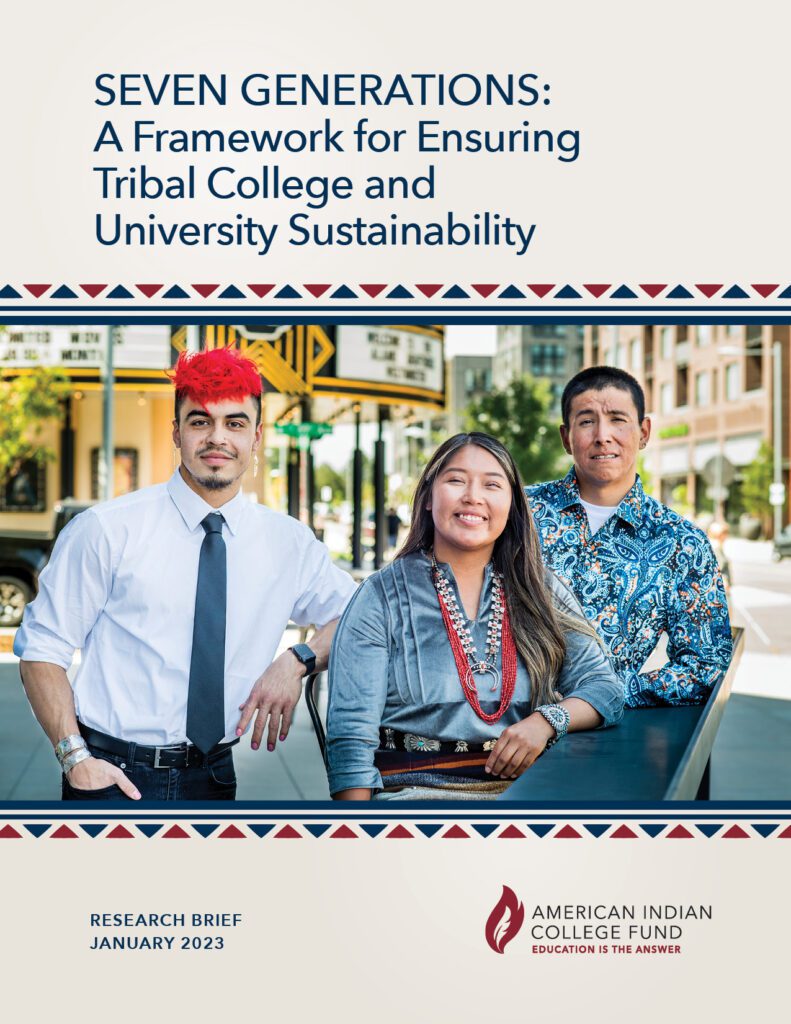American Indian College Fund Research Develops Preliminary Framework for Tribal College Sustainability
Study to help Native-serving institutions flourish for generations

Please click image to download your copy of SEVEN GENERATIONS: A Framework for Ensuring Tribal College and University Sustainability.
April 3, 2023, Denver, Colo.— The American Indian College Fund (College Fund) is releasing three briefs with findings from a three-part research project on tribal colleges and universities it conducted in 2020-21. The focus of the research includes tribal college and university (TCU) student support services, program development and review, and sustainability. TCUs are unique higher learning institutions located on or near Indian reservations with the dual mission to provide tribal citizens higher education opportunities while ensuring that degree programs, assessment, and student support structures are based in community and culture.
Unlike other higher education institutions, TCUs were chartered by tribal nations as an act of self-determination in higher education and to support Native nation-building. They play a critical role for their students and tribal communities. Despite their importance, little research has been done about TCUs, and instead research focuses on the Indigenous student experience at predominantly white institutions. The College Fund partnered with a selection of TCUs to begin filling this data gap and to offer insights into TCU practices and how to best support them.
“SEVEN GENERATIONS: A Framework for Ensuring Tribal College and University Sustainability” is one of three briefs released with this research goal in mind. The study and brief, funded by a grant from the Lumina Foundation, are the result of a collaboration between the College Fund and five TCUs. The College Fund conducted interviews with institutional leaders, faculty, and staff; reviewed available literature; and reviewed each institution’s strategic plan during the project.
TCUs offer personalized education that is located where students live. A TCU education is culturally sustaining, offered at a low cost to provide equitable access to college, and is focused on in-demand degrees and credentials. Yet TCUs are challenged because of their rural locations, which brings faculty and staff recruitment difficulties, a changing student body, and insufficient infrastructure. At least three TCUs have closed their doors to date, while many others continuing to face financial, staffing, and other challenges.
The research resulted in a nine-point framework to help TCUs focus time and resources to help them flourish and serve their students and communities in a culturally sustaining way that encourages economic development and sustainability of the institutions for generations to come.
The framework resulting from this research not only offers insights for TCUs but can also guide foundations, government offices, and Native-serving organizations as they invest in and support TCUs.
Study participants included 31 TCU leaders, faculty, and staff members from Diné College, Navajo Technical University, Nueta Hidatsa Sahnish College (NHSC), Turtle Mountain Community College, and United Tribes Technical College (UTTC). Participants centered TCU sustainability on fiscal responsibility and being highly adaptable and responsive to meet the changing needs of their students and Tribal communities.
A TCU Sustainability Framework was developed from these analyses and interviews to ensure the long-term survival and success of all TCUs. To read or download a copy of “SEVEN GENERATIONS: A Framework for Ensuring Tribal College and University Sustainability”, please visit https://resources.collegefund.org/file/seven-generations-a-framework-for-ensuring-tribal-college-and-university-sustainability/
Leander R. McDonald, President of United Tribes Technical College, said, “Research is not new to Indigenous people. We have oral traditions of leadership using information for decision making from generations past. Tribally controlled and approved studies are critical to ensuring accurate data is available to drive initiatives and policies going into the future.”
Twyla Baker, President of Nueta Hidatsa Sahnish College, said, “It is gratifying to see the release of the sustainability briefs conducted by the American Indian College Fund. Those of us in the tribal college community are quite aware of the value of and difference that a TCU education makes in our communities and in the lives of our students and their families. The impact echoes through generations, and changes trajectories for individuals, families, and by extension tribal nations. It is crucial that the work we do on so many fronts be supported and opportunities be broadened as our reach and impact grows. For that to happen, we must be allowed to tell our stories through the data. That, in part, is what these studies accomplish.”
American Indian College Fund President and CEO, Cheryl Crazy Bull, said, “As we celebrate the 50th anniversary of the TCUs founding their membership association, our research on TCU sustainability for the next seven generations is especially timely. The impact of TCUs on the wellbeing and prosperity of individuals and families is evident and sustainability research demonstrates that not only do TCUs need financial security, they also need support that strengthens their culture and language revitalization missions and their ability to fully respond to tribal and community priorities.”
About the American Indian College Fund—The American Indian College Fund has been the nation’s largest charity supporting Native higher education for 33 years. The College Fund believes “Education is the answer” and provided $14.45 million in scholarships and other direct student support to American Indian students in 2021-22. Since its founding in 1989 the College Fund has provided more than $284 million in scholarships, programs, community, and tribal college support. The College Fund also supports a variety of academic and support programs at the nation’s 35 accredited tribal colleges and universities, which are located on or near Indian reservations, ensuring students have the tools to graduate and succeed in their careers. The College Fund consistently receives top ratings from independent charity evaluators and is one of the nation’s top 100 charities named to the Better Business Bureau’s Wise Giving Alliance. For more information about the American Indian College Fund, please visit www.collegefund.org.
Journalists—The American Indian College Fund does not use the acronym AICF. On second reference, please use the College Fund.








